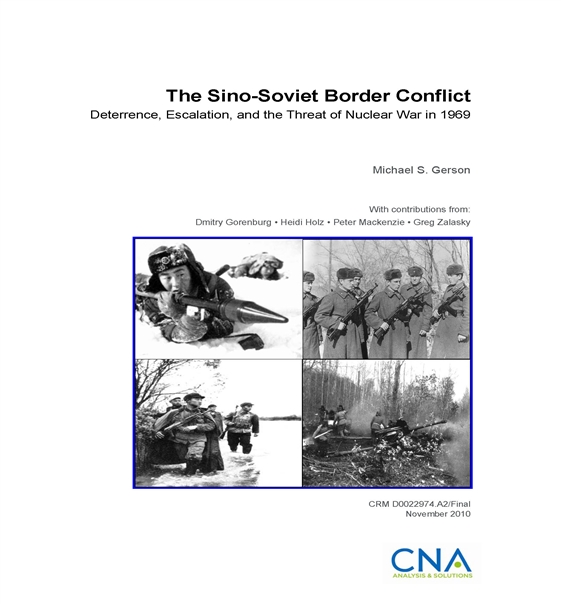On 2 March 1969, Chinese troops ambushed and killed a group of Soviet border guards on Zhenbao Island, one of the many disputed islands on the Ussuri River. As Sino-Soviet tensions heightened in the 1960s, ownership of these tiny, uninhabited, and strategically meaningless river islands along the Ussuri, which was designated as a boundary line between China and the Soviet Union by the 1860 Treaty of Peking, became an issue of contention. According to Beijing, ownership of the river islands were emblematic of broader Russian efforts, dating back hundreds of years, to expand its territory by forcing a weak China to sign “unequal” treaties that bequeathed large segments of Chinese territory to tsarist Russia. The Soviet Union, however, argued that China had no legal claim to the river islands. According to Moscow, the Treaty of Peking clearly identified the boundary line between China and the Soviet Union in this area as running along the Chinese riverbank.
For China, the attack on Zhenbao was designed to deter future Soviet provocations. The sharp downturn in Sino-Soviet relations, a significant Soviet military buildup in the border region, and the Soviet invasion of Czechoslovakia in 1968 and subsequent announcement of the Brezhnev Doctrine all convinced Mao of the need to forcibly demonstrate China’s courage, resolve, and strength in the face of what was perceived to be a looming Soviet threat. By initiating a limited attack, flexing some muscle, and killing a few Soviets, China sought to forcibly demonstrate that it could not be bullied, and that a future Soviet attack would be fiercely resisted. Mao, according to this view, wanted to teach Moscow a “bitter lesson.”
The Soviets, however, received a very different message from the attack. Whereas Mao intended to deter future Soviet aggression, Moscow interpreted China’s actions as aggressive and emblematic of an increasingly revisionist and antagonistic regime in Beijing. On 15 March, China and the Soviet Union fought again on Zhenbao, this time with much larger forces and firepower. Although the archival evidence remains incomplete, it appears that Russia initiated this conflict in retaliation for the Chinese assault two weeks earlier. In the following months, Moscow and Beijing fought several more battles along the border, resulting in a still-unknown number of casualties.
Following the conflicts on Zhenbao, Moscow adopted a coercive diplomacy strategy toward Beijing. This strategy combined repeated proposals for negotiations with Beijing to reach a peaceful settlement to the border dispute with increasingly provocative threats – including nuclear threats – if Chinese recalcitrance continued. Several times in the months following the bloodshed on Zhenbao, the Soviet Union deliberately hinted that it might use nuclear weapons, especially in a surgical strike on China’s nascent nuclear facilities.
Whereas China dismissed Moscow’s initial nuclear threats and did not respond to early proposals for negotiations, Beijing’s perception of the credibility of Soviet nuclear threats changed dramatically in the summer of 1969. On 27 August, CIA Director Richard Helms told the press that Moscow had been approaching foreign governments to inquire about their reactions to a potential Soviet preemptive strike on China. For Beijing, the knowledge that Moscow had approached other countries greatly increased the credibility of Soviet nuclear threats. If the United States took Soviet probes seriously enough to make them public, Beijing likely reasoned, then there must be a real and immediate possibility of an attack. When Moscow again proposed negotiations a few weeks later, Beijing agreed. As such, this case stands out as a rare case of successful nuclear compellence: the Soviets used nuclear threats to effectively compel China to the negotiating table.
Beijing’s eventual perception of the credibility of Soviet nuclear threats had unintended consequences that greatly increased the possibility of accidental or inadvertent nuclear escalation. Emotions, stress, and suspicion of Soviet intentions took hold in China, particularly for Mao Zedong and Lin Biao. The Chinese leadership began to worry, albeit based on little reliable evidence, that Moscow would use the border negotiations as a “smokescreen” for a nuclear “sneak attack.” By mid- October 1969, China had become so concerned about a Soviet nuclear strike that the central leadership, including Mao Zedong, fled Beijing, and on 18 October China placed its rudimentary nuclear forces on full alert – the first and only time this order has been issued.
Download reportApproved for Public Release; Distribution Unlimited. Specific authority: N00014-05-D-0500.
Details
- Pages: 74
- Document Number:
- Publication Date: 11/1/2010
